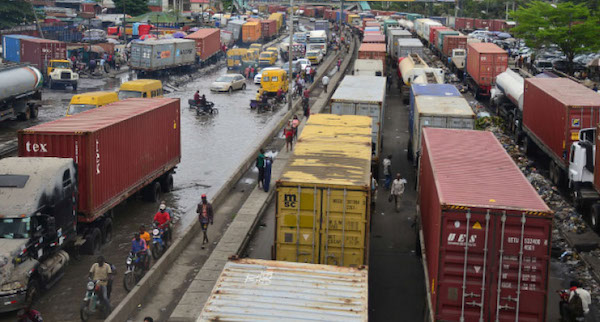
Trucking and haulage associations have declared war against those exploiting loopholes in the electronic call-up system through the purchase of “Black market” tickets to access the seaport in Lagos. This is even as they advocated for the implementation of E-Tag technology to curb irregularities.
Shipping Position Daily recalls that Trucks Transit Park Limited (TTP); operators of the electronic call up system, had while responding to allegations of parking ticket racketeering and sundry abuses of its services, introduced compulsory display of number plates of trucks on their cabins.
In a statement issued by TTP, it disclosed that the Nigerian Ports Authority (NPA) has approved the implementation of this directive, effective 29th of November 2023.
Our correspondent who took a tour along the Apapa port access roads to monitor the enforcement of this directive, observed that some trucks have complied by displaying their number plates on their cabin and the registration number conspicuously written on the body of the trucks.
However, our correspondent sighted a good number of trucks in the long queue going to the port without number plates or any identification number written on them.
Reacting to the development the Vice President of Nexus Association of Maritime Transport Operators (NAMTOP), Mr Rilwan Bello emphasized that compliance with TTP’s directives alone is not the solution to the illegalities practiced by the violators of the E-Call up system.
Bello informed that trucking associations have taken bold steps to stop illegal truck access to the port which is causing logistic disruptions at the port. According to him, this step has yielded significant progress with a noticeable improvement in the flow of exports into the port.
Bello however pointed fingers at security agents like the Police and officials of the Lagos State Traffic Management Authority (LASTMA), alleging their involvement in aiding unauthorized trucks’ access to the port.
He stressed that merely inscribing plate numbers on trucks has proven futile, as perpetrators easily manipulate this method by rubbing them off when they patronize the e-call up “black market” vendors. Instead, Bello suggested that the solution lies in preventing these violators from gaining access into the port.
The NAMTOP Vice President noted that the night monitoring exercise carried out by representatives from trucking associations have facilitated smoother port operations, resulting in a noticeable free flow of trucks into the ports.
Giving an insight into what the truckers associations are doing, he said: “As of yesterday I slept outside. I was on Total Bridge until 3.45am before I came home. The trucking associations decided to go out and stay all night to make sure that all those illegal trucks that are causing the infraction don’t have access to the port. We did that so that those that follow the procedure of going through the pre-gates can have access to the port.
“So we can see now that it is an arrangement by some of these security agents like the Police and LASTMA. They are the one aiding those trucks that we are talking about, to get to the port. So it is not by writing plate numbers on the body of the truck, it is by making sure that those that perpetrate those illegal doings and infractions don’t have access to the port”.
“We met some of them yesterday during the day and in the night we conditioned ourselves that some of us should stay back and between Total to port gate, was free for other road users including the port access road from Ijora Olopa to Total Bridge. This was because those who commit the infraction know we will catch them, so they were afraid and stayed back. So if we do this exercise from now to next week, we would have a significant change”.
Also speaking, the Secretary General of the Association of Maritime Truck Owners (AMATO), Bala Muhammed emphasized the urgency of adopting E-Tag technology as a fool-proof solution. According to him, this technology, once affixed, cannot be tampered with or transferred, presenting a formidable solution to curb unauthorized access.
He noted that a proposal has been written to the Nigerian Port Authority (NPA) for the implementation of non-transferable E-Tags ensuring that only authorized trucks, embedded with unique E-Tags, gain port entry.
Additionally, Muhammed advocated for unified access barriers across terminals to prevent mismatched access tickets and deter black market transactions which undermine the fair call-up system. He however called on NPA to fast track the deployment of the E-Tag solutions and make sure that all the terminals have their access barriers to avoid criss-crossing from one terminal to another by trucks.
“Yes, the truckers are actually complying. Some are while some are not complying but that will not address the problem. What we need now is an E-Tag technology solution, whereby once it is installed on your truck, it is not transferable. Once the truck approaches the port gate, the access barrier will read it and open up for it to have access to the port. Once it is embossed on the truck, there is no way it will be removed for another truck to use because, it will get damaged. So eTAG is the way forward.
On the contrary, a truck owner, Mr Kunle Ajayi acknowledged truckers’ improved compliance to the directives, but emphasized the adaptability of individuals in bending the rules. He confirmed that the plate numbers are not permanent and can still be swapped by truckers who want to bend the rules.















